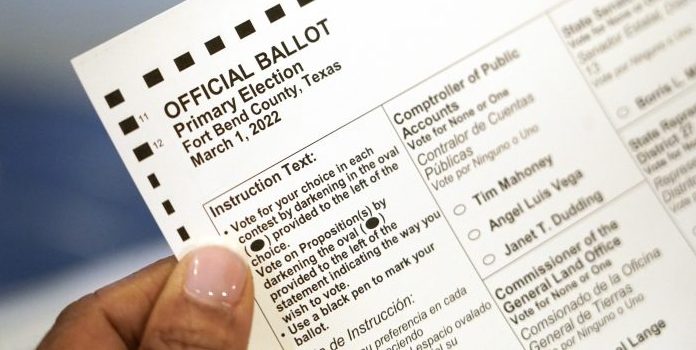(Headline USA) Texas began early voting Monday in 2022’s first primary following a rollout of tougher election-integrity measures, forcing the return of hundreds of mail ballots that failed to meet the new security standards.
“Monday is going to be a big day for all of us to see how this plays out,” said Isabel Longoria, the elections administrator for Harris County, which includes Houston and more than 2 million voters.
“I think for all of us there is just a sense of uncertainty,” she said.
The county was plagued last election with a litany of scandals related to its inappropriate distribution and collection of mail-in ballots.
That led to an FBI probe that ensnared Dallas Jones, Texas political director for the Joe Biden campaign.
Election-integrity watchdog group the Public Interest Legal Foundation also filed a lawsuit demanding that self-identified noncitizens who voted in the 2020 election be identified.
The recent legislative changes were designed to make it “easier to vote and harder to cheat,” said Republican Gov. Greg Abbott when he signed the bill last September.
Harris County election officials announced just days before the first votes were cast in person that 40% of mail ballots received so far had already been sent back, mostly because they did not include required identification and signatures now mandated under Texas law.
Texas is among at least 18 states that will hold elections this year with heightened restrictions in response to Democrats’ bad-faith abuse of mail-in voting in the 2020 elections.
But after Democrat legislators attempted to delay the legislation by fleeing to Washington, DC, Texas had less time than any other state to complete the work of changing how elections are run.
Also contributing to the chaos was its especially early primary March 1—two months before the next states, Indiana and Ohio, go to the polls in May.
How smoothly Texas’s primary goes in the coming weeks will be as closely watched as the actual races, few of which are high-profile.
For Republicans, Abbott is heavily favored over a crop of conservative challengers in his campaign for a third term, but Attorney General Ken Paxton is fighting a tougher primary.
Democrat Beto O’Rourke has an almost clear path for his party’s nomination for governor. One of the biggest races in South Texas, where Democrat in U.S. Rep. Henry Cuellar is in a rematch against a progressive challenger, Jessica Cisneros, a candidate endorsed by socialist Rep. Alexandria Ocasio–Cortez.
It’s the first primary for new Texas Secretary of State John Scott, an Abbott appointee, who in an interview described the returned ballots and applications as voters adapting to the new rules.
He anticipates the May runoffs and November elections will run smoother, and said he does not think the issues so far and concerns expressed by local officials amount to a failure by the state.
“I don’t know how more time—I don’t want to say it wouldn’t have been helpful, because it would have been helpful—but I don’t know that more time fixes that issue, because it’s a new process,” Scott said. “And I think new processes, especially to those voters who were used to the old process, that absolutely is a friction point.”
But the issues have extended beyond voters navigating new requirements.
When the far-left League of Women Voters last month requested thousands of voter registration applications for new U.S. citizens, the state said it could not fulfill the request because of paper supply chain shortages after the new law required the forms to be updated and reprinted.
Then, county election offices reported they were having to send back an unusually high number of mail ballot applications for not including required identification such as a driver’s license or Social Security number. Now, counties say they are sending back completed ballots for the same reason.
Voters have a chance to correct the ballot as long as it is returned by Election Day, which has left officials waiting to see how many come back.
Scott said the number of rejected mail ballot applications had fallen to below 5% by this month.
He took the job as Texas’ chief election officers after serving previous roles under Abbott and a brief stint with former President Donald Trump’s legal team, which challenged the 2020 election results.
Scott withdrew from the case after only a few days and said he does not dispute that President Joe Biden won the election.
Outside San Antonio, Kendall County Elections Administrator Staci Decker said mail ballot applications are at a low ahead of the primary in her overwhelmingly Republican county that voted for Trump by a margin of 3-to-1 in 2020.
The mostly rural county has for years kept a list of about 400 voters who are sent mail ballot applications. But Texas Republicans added a prohibition this year on government officials proactively sending out mail ballots, under the threat of felony charges and six months in jail.
Late Friday night, a federal judge issued a narrow order that blocked the state from enforcing that portion of the law around Houston and Austin. But the order had no bearing on 251 of Texas’ 254 counties, including Kendall.
“We had 400 people that just sat there waiting for their application to come and they never did,” said Decker. She said her office has sent about 500 ballots to voters this year, down from the 700 to 900 they normally mail.
Adapted from reporting by the Associated Press

